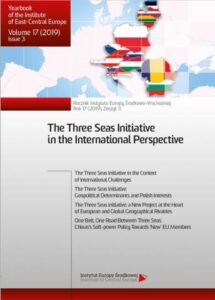ORCID: George Soroka: 0000-0003-2796-315X
Pages: 15-29
Edition: Lublin 2019
DOI: http://doi.org/10.36874/RIESW.2019.3.2
Citation method: G. Soroka, T. Stępniewski, The Three Seas Initiative: Geopolitical Determinants and Polish Interests, „Rocznik Instytutu Europy Środkowo-Wschodniej” 17 (2019), z. 3, s. 15-29, DOI: 10.36874/RIESW.2019.3.2.
Keywords: CEE, Polish Foreign Policy, Three Seas Initiative
Abstract:
Since 2015, Polish foreign policy has witnessed a gradual rise in the significance of regional cooperation, as reflected in its enthusiasm for the Three Seas Initiative (TSI). The Initiative constitutes an in statu nascendi under the region between the Baltic, Black, and Adriatic Seas. (In Poland, a popular acronym to denote the project is the ‘ABC initiative,’ which reflects the Polish names of these bodies of water [i.e., Adriatyk, Bałtyk, Czarne]. However, it must be emphasized that the member states of the TSI do not operate in a vacuum, but rather within a broader institutional framework that includes the European Union, the Central European Initiative, and the Visegrad Group. This paper begins by outlining the prospective geopolitical determinants that will determine the success or failure of the TSI, with particular attention paid to issues of regional security. It concludes by analysing how the Initiative may become a new model for regional cooperation.
Bibliography:
Ankieta Arkanów, ‘Ekonomiczne i kulturowe podstawy Trójmorza, Arcana. Kultura, Historia, Polityka, no. 5 (137), Cracow 2017, pp. 19-39.
Atlantic Council, ‘The Road Ahead – CEE Transport Infrastructure Dynam- ics’, Joint Atlantic Council – PwC Report, https://www.pwc.com/gx/en/ industries/capital-projects-infrastructure/publications/the-road-ahead. html [2019-11-04].
Bieliszczuk B., ‘Trójmorze: współpraca na rzecz unijnego i regionalnego rynku gazu’, PISM Bulletin, no. 63 (1505), 30 June 2017, www.pism.pl.
Chodakiewicz M.J., Intermarium: The Land Between the Black and Baltic Seas, New York: Routledge, 2017.
Chojan A., ‘Grupa Wyszehradzka w polityce zagranicznej Polski – między współpracą a rywalizacją’, Biuletyn Analiz i Opinii ZE ISPPAN, no. 4, 2016.
Eberhardt P., ‘Ekonomiczne i kulturowe podstawy Trójmorza. Ankieta „Arkana”’ Arcana. Culture, History, Politics, no. 5 (137), 2017, pp. 20-21.
Gniazdowski M., ‘Trójmorze – nowy instrument w polskiej polityce zagranicznej’, Polski Przegląd Dyplomatyczny, no. 4 (71), 2017, pp. 79-82.
Heritage Foundation, ‘Advancing Liberty and Economic Freedom Through the Three Seas Initiative’, 8 March 2018, https://www.heritage.org/eu- rope/event/advancing-liberty-and-economic-freedom-through-thethree-seas-initiative [2019-11-20].
Kawczynski S., ‘Why Germany should care about B9?’, New Eastern Europe, 29 June 2018, http://neweasterneurope.eu/2018/06/29/germany-careb9/ [2018-07-04].
Kobzová J., ‘The Visegrad Group in Eastern Europe: an actor, not a leader yet’,
Visegrad Insight, no. 2, 2012, p. 62, http://visegradrevue.eu/the-visegradgroup-in-eastern-europe-an-actor-not-a-leader-yet/ [2019-01-06].
Kokot M., ‘Wyłom w Trójmorzu. Czesi nie chcą być częścią antynie- mieckiego paktu’, Gazeta Wyborcza, 19 June 2017, http://wyborcza.pl/ 7,75399,21976040,wylom-w-trojmorzu-czesi-nie-chca-byc-czescia-antyniemieckiego.html [2018-12-15].
Kowal P., Orzelska-Stączek A., Inicjatywa Trójmorza: geneza, cele i funkcjonowanie, Warsaw: Instytut Studiów Politycznych PAN, 2019.
Kurecic P., ‘Can the Three Seas Bring a New Balanceto European Politics’, New Eastern Europe, no. 2, 2019, http://neweasterneurope.eu/2019/03/05/can- the-three-seas-bring-a-new-balance-to-european-politics/ [2019-10-15].
Ministry of Infrastructure of Poland, ‘Via Carpatia wpisana do projektu rozporządzenia CEF’, News, 6 June 2018, https://www.gov.pl/web/in- frastruktura/via-carpatia-wpisana-do-projektu-rozporzadzenia-cef [2018-06-25].
Olejarz T., Stępniewski T., ‘Grupa Wyszehradzka: status polityczny i specyfika działań międzynarodowych na przykładzie inicjatywy Partnerstwa Wschodniego Unii Europejskiej’, Rocznik IEŚW, no. 11 (1), 2013, pp. 107-125.
Orzelska-Stączek A., ‘Inicjatywa Środkowoeuropejska a Trójmorze – odmi- enne koncepcje współpracy w Europie Środkowo-Wschodniej’, Studia Polityczne, no. 1 (46), 2018, pp. 149-169.
Przybylski W., ‘V4 Upgrade: Polish presidency in the Visegrad Group’, New Eastern Europe, no. 3 (VIII), July-September 2013, pp. 68-74.
Sienkiewicz M., ‘Koncepcja Trójmorza w polityce zagranicznej Polski po 2015 r.’, Dyplomacja i Bezpieczeństwo, no. 1, 2016, pp. 139-151.
Szczerski K., Utopia europejska: kryzys integracji i polska inicjatywa nap- rawy, Cracow: Biały Kruk, 2017.
‘The Joint Statement on the Three Seas Initiative (The Dubrovnik State- ment)’, 25 August 2016, http://predsjednica.hr/files/The%20Joint%20State- ment%20on%20The%20Three%20Seas%20Initiative(1).pdf [2019-11-25].
The Polish Quarterly of International Affairs, no. 2, 2017.
Trump D., ‘Remarks by President Trump at the Three Seas Initiative Summit’, The White House, 6 July 2017, https://translations.state.gov/2017/07/06/ remarks-by-president-trump-at-the-three-seas-initiative-summit-ju- ly-6-2017/ [2019-11-14].
TSI, ‘The Three Seas Initiative: About’, http://three-seas.eu/about/ [2019- 10-23].
Ukielski P., ‘Mapa Trójmorza. Przegląd punktów wspólnych i rozbieżności w polityce 12 państw regionu’, Raport Centrum Analiz Klubu Jagiellońskiego, no. 3/2016, http://cakj.pl/wp-content/uploads/2016/11/Raport-3-2016.pdf [2018-05-20].
Visvizi A., Stępniewski T. (eds), ‘Poland, the Czech Republic and NATO in Fragile Security Contexts’, IESW Reports, December 2016.

PDF: Download